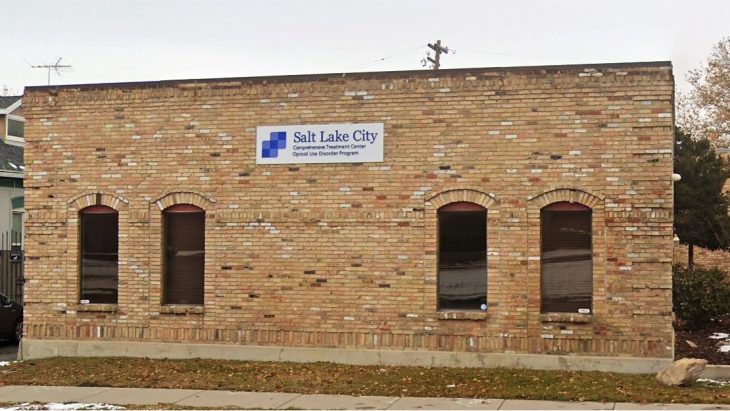Salt Lake City Comprehensive Treatment Center

About Salt Lake City Comprehensive Treatment Center
Nestled beneath the Wasatch Range and surrounded by world class skiing and golfing resorts, you can find Salt Lake City Comprehensive Treatment Center. They’re an outpatient addiction treatment center based in Salt Lake City, Utah. They accept clients over the age of 18 and specialize in helping people experiencing opioid use disorder.
Their approach to addiction treatment is considered and thoughtful. The care team places a lot of emphasis on developing a personalized treatment plan for every client. This starts with comprehensive intake evaluations that help the team understand exactly what you need to thrive.
Outpatient Detox for Accessible Recovery
Detoxing is an important first step in recovery, but can be difficult to coordinate with your real-life responsibilities. Salt Lake City CTC offers medication-assisted treatment (MAT) on an outpatient basis through the use of methadone, buprenorphine, and Suboxone. These medications remove most of the physical discomfort associated with recovery, giving you the mental bandwidth to focus on things you learn in individual or group counseling.
They believe that MAT is only effective if you address emotional, behavioral, and social issues that impede healing. You can supplement that healing by clearing your mind and relaxing at local attractions, like Liberty Park or Pioneer Park.
Programs to Help Folks with Chronic Health Conditions
One thing I like about this center is that they tailor their programs for people living with chronic health conditions, including HIV/AIDS or chronic pain. In counseling sessions, you’ll develop sustainable ways to cope with health complications or setbacks. You’ll have a safe place to process any frustration or disappointment.
Some past clients expressed concerns about the administration at the center. Others praised the staff’s dedication and the way the program created opportunities for personalized care.
| Levels of Care | Detox Service Setting | Programs | Payment Options | ||
|---|---|---|---|---|---|
|
In outpatient therapy, you’ll attend therapy sessions several times each week while living at home. This is ideal if you have a strong support system and a lower risk of relapse. Outpatient treatment offers flexibility to maintain work, school or family obligations. |
Aftercare programs provide ongoing support after you complete a rehab program. They may include several components to help you maintain sobriety including therapy, community support groups and relapse prevention strategies. This gives you a network of resources as you reintegrate into your daily life. |
||||
|
Outpatient detox gives you access to medically supervised withdrawal services while still allowing you to live at home. You’ll attend a clinic for treatment and monitoring. This flexible option is suitable for those with mild to moderate withdrawal symptoms who have strong support systems. |
|||||
|
Adult programs address the substance use and life challenges specific to adults. Therapists can deliver sessions in individual, group and family settings. Services often include job support and life skills training in a structured environment. |
Drug detox programs support individuals who are withdrawing from addictive substances like cocaine and heroin. Medical support helps you manage symptoms in a controlled and safe environment so you can achieve initial sobriety. |
Men's programs address substance use while also considering the social pressures, family roles and mental health concerns that are specific to men. You’ll learn healthy coping mechanisms as you build emotional resilience and develop communication skills. |
Opioid detox uses medications to ease severe withdrawal symptoms. It also includes medical supervision to help you manage potential complications. These services allow you to stabilize and begin a recovery plan. |
Women's programs offer a safe and supportive space to focus on gender specific issues such as trauma, family roles and mental health conditions. Therapists tailor the sessions to address women's needs and foster empowerment in a healing and nurturing environment. |
Young adult programs are designed for individuals who are transitioning into adulthood. Topics of discussion typically include identity, independence and peer relationships. Providers may also offer life skills training and career support. |
|
Payment Assistance
|
Medicaid
|
Private Insurance
|
Self Pay
|
Levels of Care
In outpatient therapy, you’ll attend therapy sessions several times each week while living at home. This is ideal if you have a strong support system and a lower risk of relapse. Outpatient treatment offers flexibility to maintain work, school or family obligations.
Aftercare programs provide ongoing support after you complete a rehab program. They may include several components to help you maintain sobriety including therapy, community support groups and relapse prevention strategies. This gives you a network of resources as you reintegrate into your daily life.
Detox Service Setting
Outpatient detox gives you access to medically supervised withdrawal services while still allowing you to live at home. You’ll attend a clinic for treatment and monitoring. This flexible option is suitable for those with mild to moderate withdrawal symptoms who have strong support systems.
Programs
Adult programs address the substance use and life challenges specific to adults. Therapists can deliver sessions in individual, group and family settings. Services often include job support and life skills training in a structured environment.
Drug detox programs support individuals who are withdrawing from addictive substances like cocaine and heroin. Medical support helps you manage symptoms in a controlled and safe environment so you can achieve initial sobriety.
Men's programs address substance use while also considering the social pressures, family roles and mental health concerns that are specific to men. You’ll learn healthy coping mechanisms as you build emotional resilience and develop communication skills.
Opioid detox uses medications to ease severe withdrawal symptoms. It also includes medical supervision to help you manage potential complications. These services allow you to stabilize and begin a recovery plan.
Women's programs offer a safe and supportive space to focus on gender specific issues such as trauma, family roles and mental health conditions. Therapists tailor the sessions to address women's needs and foster empowerment in a healing and nurturing environment.
Young adult programs are designed for individuals who are transitioning into adulthood. Topics of discussion typically include identity, independence and peer relationships. Providers may also offer life skills training and career support.




